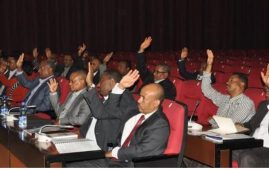The news that the 180-member EPRDF Council will vote on new leaders by the end of next week – with the implication a new Prime Minister will be voted on after that – irked those of us who were hoping for a faster succession. And, justifiably so.
But it also revived previous questions and doubts as well as new once.
Here is my brief take on those legal and political issues.
1. Who elected/appointed Hailemariam as an acting PM?
On Aug. 21, at dawn, , the Council of Ministers issued a statement that broke the news of the passing of the late PM Meles Zenawi to the world as well as the fact that Dep. PM and Foreign Minister Hailemariam Desalegne is in charge. A few hours later, Bereket Simon, Minister of Office for Government Communication Affairs, underlined in a press conference that Hailemariam is an Acting PM with all the responsibilities of the late PM.
Following that, some news outlets and commenters hastily claimed that the Council elected an Acting PM.
However, what the Council said was:
“His Excellency Deputy Prime Minister Hailemariam Desalegn will, in accordance with the FDRE Constitution, continue to carry out the responsibilities of heading the Council of Ministers.” [emphasis mine]
The statement was nothing but a re-affirmation that members of the Council will abide by the law. It has already stipulated by Proclamation No. 4/1995, Article 7(3), that: “In the absence of the Prime Minister, the Deputy Prime Minister shall chair the meetings of the council”.
Similarly, Minister Bereket’s statement could be nothing but a statement of fact. If Hailemariam is working in lieu of the late Prime Minister, it goes without saying that he is an Acting PM. Of course, that term “Acting PM” is not found in Ethiopian laws, nor is it in any other country’s that I know of.
Thus, Hailemariam became Acting PM by automatic operation of the law rather than by an appointment any organ.
2.Does Hailemariam have a Constitutional mandate?
In deed, the confusion regarding Hailemariam – and the post of Dep. Prime Minister – can be attributed to politically motivated misinformation made in the early August, that misled even genuine observers.
To begin with, the Constitution clearly states that the Deputy PM shall “act on behalf of the Prime Minister in his absence”.
The fact that the term “absence” includes both temporary and permanent absence can be simply be understood from the way the term “deputy” would have been understood by the drafters of the Constitution. It is a common and hardly questioned legal norm in this country that a deputy substitutes a head/minister/commissioner of an organization in case the later vacates her post and until a replacement is elected by the proper organ. That is simply because the relevant law or by-law states the deputy “acts on behalf of the head”.
This is an argument/interpretation based on the original intent of the Constitutional drafters. Of course, this is just one of the methods of Constitutional interpretation, as there are a few more approaches.
Dare I say, a judge using any of those methods would affirm that the Ethiopian Constitution mandates the Dep. PM to fill for the PM, when the latter dies or becomes incapacitated.
3. Did the Constitution fail to set a succession mechanism?
One major source of misunderstanding is the misleading comparison of the Ethiopian system with those of USA, Ghana and the like.
In Presidential system countries, the President and the Parliament are elected separately and with their own electoral mandate. Thus, Constitutional drafters have to devise an automatic replacement mechanism for the Presidency, as the parliament has no inherent power to elect a President and calling a fresh election is time-taking and costly. Thus, most Presidential system Constitutions stipulate that in case the President dies in office, the Vice-President automatically becomes President. It is to ne noted that in most cases the Vice President is elected along the President on an identical electoral platform.
On the other hand, parliamentary systems like UK and Germany – from which the Ethiopian Constitution is mainly drawn – follow a different approach. In these countries, the Deputy Prime Minister does not even have a clear legal mandate to act on behalf of the PM, when the latter is absent – be it temporary or permanently.
In the UK, the power to appoint a PM is theoretically that of the Queen (practically, the leader of the party with largest number of seats in the parliament makes the appointment). The Deputy PM is not even recognized in Constitutional documents. The post is simply a creation of the Prime Minister, who may not appoint anyone if s/he wishes to. In fact, the Dep. PM couldn’t get a salary unless he doubles as a head of some other organ.
In Germany, it is the President who propose a Prime Minister (Chancellor) and have it approved by the parliament. In case the PM dies or becomes incapacitated, the President appoints one of the Ministers to serve as acting Prime Minister. The Deputy PM, though mentioned in Constitutional documents, has no clear list of powers and is simply appointed by the PM from one of the Ministers. The German Basic law does not say that the Dep. PM acts in behalf of the Prime Minister.
It should also be noted that both in UK & Germany, Ministers, including the Dep. PM, are appointed by the Prime Minister without a need for parliamentary approval. However, both in UK and Germany, the Dep. PM fills for the PM when the latter is ‘permanently unavailable’, until the authorized organ make an appointment (in UK – a new PM, in Germany – an Acting PM). This often takes days if not weeks.
The logic here is that: Unlike in Presidential systems where calling immediate fresh elections is cumbersome, in Parliamentary systems the relevant body (the Queen/President and/or the parliament) could be summoned as soon as necessary. Thus, why limit their power of appointment by stipulating in advance who would succeed the PM.
The Ethiopian Constitution, though inspired by the UK and assisted by German Constitutional lawyers, improvised some of the rules.
*The office of the Dep.PM is not a creation of the PM rather a constitutionally recognized one.
*The Dep. PM is explicitly mandated to act on behalf of the Prime Minister, when the latter is absent.
*The Dep. PM, alongside other Ministers, is appointed by the parliament.
In short, the Ethiopian Constitution made the mandate of the Dep. PM more firm and explicit, while maintaining the power of the Parliament to decide on a new PM.
4. How long can Hailemariam stay as an Acting PM?
The short answer is: Until 2015 unless the Parliament moves otherwise.
Let me present this point in simple terms.
Granted, some might doubt my interpretation on the Constitution. Yet, it is certain that when the parliament enacted Proclamation 04/95, quoted above, it was meant to mandate the Dep. PM to chair the Council of Ministers even where the PM dies or is incapacitated. Otherwise, all Ministries, Commissions, Agencies, etc. who were headed by their Deputies (because their Chiefs resigned, fired and, fled) since 1991 – even before that – based on similar proclamations, would be illegal. No sane lawyer would accept such a bizarre interpretation of a legal provision.
Thus, having the uncontestable status of Acting Chair of of the Council of Ministers, Hailemariam can practically do everything that a full-fledged Prime Minister could do. Including, submitting to the parliament a draft law for declaring war.
Though the powers and functions of the Council of Ministers are broad and cover most powers of the Prime Minister, there is one area where the status of Acting Acting Chair of the Council falls short. The power of making appointments and with regard to awards and prizes.
Well, the Dep. PM, as Chair of the Council, could make appointments below Ministerial positions, given the Constitutional mandate of the Council of Ministers to “decide on the organizational structure of ministries and other organs of government responsible….coordinate their activities and provide leadership”.
Can Hailemariam make nominate for Ministerial positions? This can be best answered by another question: Will the Parliament approve Hailemariam’s nominations? A rejection would amount to a vote of no confidence. Even a full-fledged Prime Minister would have to resign if s/he couldn’t secure the backing of the majority in parliament.
Thus, at the end of the day, what matters is whether Hailemariam has the support of the Parliament. If affirmative, it is immaterial whether he is called “Prime Minister”, “Acting Prime Minister”, etc. he would for all practical reasons be the head of the government until 2015, when the Parliament’s term ends.
******************
[I will shortly return with the political issues – with regard to the delay and apparent inconsistencies]
You may read a brief bio of Ethiopian Ministers (here).
Check the Meles Zenawi archive or the EPRDF archive or the Cabinet members archive for related posts.
[please use the search bar at the top right side, until I organize some old posts and contents in line with current readers’ interest.






1 Comment on this post
Comments are closed.
Leave a Comment